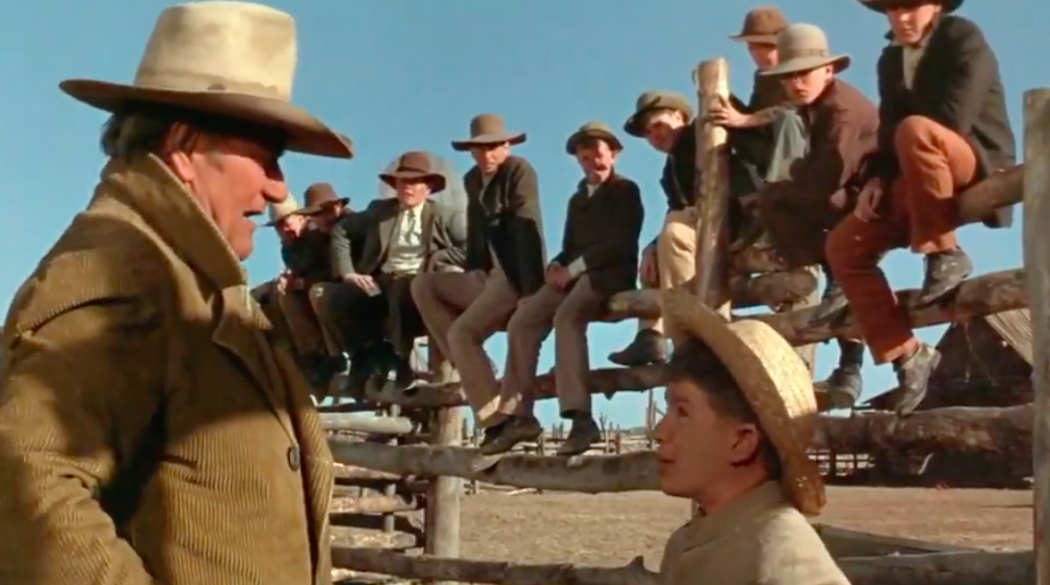John Williams’ sweeping Americana deserves an appreciation, albeit from a distance
Short of one franchise, The Cowboys marks the first time in Cinematheque’s John Williams retrospective where the notoriety and ubiquity of one figure might overshadow the composer’s work. John Wayne movies all have proper titles but ultimately, John Wayne movies are still John Wayne movies, and it’s often easier to separate them less by title than by a brief summary. The Searchers isn’t The Searchers but rather the John Wayne movie where he’s a Civil War vet. The Quiet Man is the John Wayne movie where he’s an Irish farmer, and True Grit becomes the John Wayne movie where he’s a drunk U.S. Marshal.
The Cowboys is the John Wayne movie where he’s an old cattle rancher. After losing his hired hands to the gold rush craze, Wil Andersen recruits schoolboys to help him transport 1,500 cattle across 40 miles from Montana to South Dakota.
A coming of age story enlivened by Wayne’s contrast with the on-screen youth, this is director Mark Rydell’s second collaboration with John Williams after 1969’s The Reivers; it’s also the more memorable one. The Cowboys brands its music in an instant with a furious, galloping main theme. Rollicking and fun, it’s a motive Williams returns to again and again though nothing is as exciting as the opening sixteenth notes from main title’s French Horn battery, proud if just a touch too shrill. As far as film music goes, The Cowboys is a standard, beloved by score enthusiasts and high school band directors alike.
No complete recording of The Cowboys exists, but Varèse Sarabande’s CD release is available on streaming services like Spotify and offers a half-hour’s worth of music. Too much is segmented into sampled cues, chopping up what, when experience in-context, is a grand nod to the great American composers. Interstitial spaces are filled with lithe, spritely figures that are staples in Aaron Copland, and mid-century American titans like Leonard Bernstein and Jerome Moross had a clear hand in shaping instrumentation and texture (for existing remnants of this see “The Ranch”).
What resonates on the recording is Williams and Rydell’s insistence on youth as a theme. No story of adulthood is worth a damn without a compelling sense of immaturity, musically embellished with ample vibraslap and simple lines from acoustic guitar. It’s also a theme that turns up in cues like “Schoolboys or Cowboys?” when Wil first visits the schoolhouse. Williams’ beta motive, a lackadaisical backbeat jig, gets a fun feature in “Wild Horses.” As the boys are sized up for their services, Rydell omits music completely — that is, until the boys prove to Wil they have their wits about them. “Wild Horses” makes a rousing appearance as each boy rides a bucking bronco, passing the first of many tests to come.
Like most westerns, The Cowboys is an anachronism. Its sweeping Americana is restless and determined, stubborn and charming in equal measure. It’s also plagued by the idealization of manifest destiny and the faux-humility of light-skinned saviors. Williams’ music is gorgeous and awe-inspiring, but it’s difficult to divorce the score’s nostalgic, Pollyanna perspective for the west from the lives lost and the families displaced as a result of those same pursuits. For film preservationists and cinematic purists, The Cowboys at its best represents a throwback to a bygone era when most movies came with an overture and a musical intermission. Those headed to the Chazen will indeed have a musical break to enjoy a genius at work, but intermissions also offer plenty of time to sit and think.
- UW Cinematheque presents The Cowboys on Sun, Mar 5 at 2:00p in the Chazen Art Museum. Admission is FREE and open to the public.

